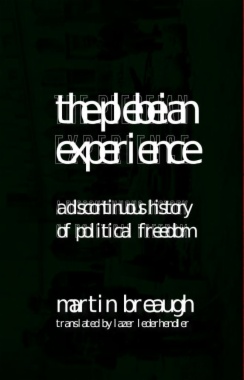How do people excluded from political life achieve political agency? Through a series of historical events that have been mostly overlooked by political theorists, Martin Breaugh identifies fleeting yet decisive instances of emancipation in which people took it upon themselves to become political subjects. Emerging during the Roman plebs's first secession in 494 BCE, the plebeian experience consists of an underground or unexplored configuration of political strategies to obtain political freedom. The people reject domination through political praxis and concerted action, therefore establishing an alternative form of power.
Breaugh's study concludes in the nineteenth century and integrates ideas from sociology, philosophy, history, and political science. Organized around diverse case studies, his work undertakes exercises in political theory to show how concepts provide a different understanding of the meaning of historical events and our political present. The Plebeian Experience describes a recurring phenomenon that clarifies struggles for emancipation throughout history, expanding research into the political agency of the many and shedding light on the richness of radical democratic struggles from ancient Rome to Occupy Wall Street and beyond.
- Contents
- Foreword by Dick Howard
- Preface
- Acknowledgments
- PART I: WHAT IS "THE PLEBS"?
- 1. Historical Genesis of the Plebian Principle
- The Roman Republic: The First Plebian Secessian (494 BCE)
- Florence: The Ciompi Revolt (1378)
- Romans: Carnival and Revolt (1580)
- Excursus 1: On the "Originary Division of the Social"
- Naples: The Revolt of Masaniello (1647)
- Excurusus 2: On the "Intractable"
- 2. Philosophical Genesis of the Plebeian Principle
- Machiavelli: The Plebs, Conflict, and Freedom
- Montesquieu: In Praise of Division
- Vico: The Plebs and the "History of All the Cities of the World"
- Ballanche: The Plebeian Principle
- De Leon: The Leaders of the Plebs
- Foucault: The Plebs Baseness or Resistance?
- Ranciere: The Plebeian Disagreement
- Answer to the Question, "What Is 'the Plebs'?"
- PART II: THE QUESTION OF THE FORMS OF POLITICAL ORGANIZATION
- Prologue: On the Dominant Political Configuration of Modernity
- 3. Sectional Societies and the Sans-Culottes of Paris
- Origin and Action of the Sectional Societies
- First Exemplary Political Struggle: Against Centralization
- Second Exemplary Political Struggle: Against the Great Specialists
- A Practice of Insurrection
- The Insurrection Against the Girondins
- The Insurrection Against the Thermidoreans
- 4. The London Corresponding Society and the English Jacobins
- On the Plebs: Thinking with Thompson against Thompson
- On the English Jacobins
- Eighteenth-Century England and the French Revolution
- "That the Number of Our Members Be Unlimited"
- "The Liberty Tree"
- A Heritage Without a Testament?
- Plurality
- Political Capacity
- Otherness
- New Political Spaces
- Active Citizenship
- 5. The Paris Commune of 1871 and the Communards
- What Is a Communard?
- Toward the Paris Commune: A Political Apprenticeship
- Political Clubs Under the Commune: A Radical Democracy
- The Communalist Contribution: Critique of Politics, Practice of Freedom
- PART III: THE NATURE OF THE HUMAN BOND
- Prologue: Social Bond, Political Bond, and Modernity
- 6. The Sans-Culottes: A Political Bond of Fraternity
- Fraternity in Action
- Fraternization as Political Practice
- Politics, Violence, and Fraternity: A Tenuous Political Bond
- Rosseau's Legacy? On Undividedness Among the Sans-Culottes
- 7. The English Jacobins: A Political Bond of Plurality
- The Industrial Revolution in England
- The Break-Up of the Traditional Social Bond
- Rebonding: The London Corresponding Society
- "Unlimited Number" Plurality as Political Bond
- A Political Bond of Division?
- 8. The Communards: A Political Bond of Association
- The Political Situation in France Before the Commune
- A Core Principle of Communal Action: Association
- Association as Political Bond
- Dividedness or Undividedness Among the Communards?
- Conclusion
- Notes
- Bibliography
- Index

